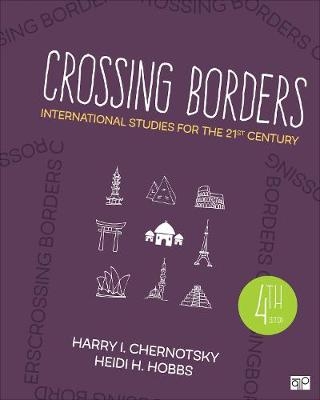
Crossing Borders
Cq Press (Verlag)
978-1-5443-7806-0 (ISBN)
Crossing Borders helps students develop a framework for understanding the various disciplines that constitute international studies by exploring the many boundaries they knowingly (and unknowingly) cross on a daily basis. Renowned authors Harry I. Chernotsky and Heidi H. Hobbs address the diverse fields of international studies—geography, politics, economics, sociology, and anthropology—giving instructors a launching point to pursue their own disciplinary interests. This bestseller not only helps students to better grasp international affairs, but also offers advice on how they can engage with global issues through study abroad, internships, and career options.
Updated thoroughly to reflect recent events and trends, the Fourth Edition assesses the COVID-19 pandemic; the use of social media to interfere in elections; the role of China in trade, investment, and finance; and the tensions surrounding persistent racial and gender inequities around the world.
Included with this text
The online resources for your text are available via the password-protected Instructor Resource Site.
Harry I. Chernotsky is Professor in the Department of Global Studies at the University of North Carolina at Charlotte and served as the founding chair of the department from 2009-2016. Previous positions included Director of International Studies and Interim Associate Dean of the College of Arts & Sciences. He is the recipient of UNC Charlotte’s Bank of America Teaching Excellence Award and its International Education Faculty Award. Chernotsky received his Ph.D. in Political Science from Rutgers University and specializes in international political economy and American foreign policy. He is co-author (with Heidi Hobbs) of Crossing Borders: International Studies for the 21st Century (about to enter its 4th edition) and has published in a wide range of professional journals. He has also been a leader in international studies education. In addition to spearheading numerous initiatives at UNC Charlotte, including the development of the Model United Nations program and the interdisciplinary International Studies major, he was Director of the North Carolina Great Decisions public affairs series for many years. He has served as President of the Southern region of the International Studies Association (ISA) and as Chair of ISA’s International Education section. He lectures widely on international affairs and consults on international education issues and programming. In recent years, he has been Scholar in Residence at Florida Atlantic University’s Osher Lifelong Learning Institute and has worked closely with the University of Cantabria (Spain) on a global studies certificate project. Heidi H. Hobbs is the director of the Master of International Studies program and an associate professor of political science in the School of Public and International Affairs at North Carolina State University. She has a PhD in international relations from the University of Southern California.
List of Tables, Figures, and Maps
Preface
Acknowledgments
About the Authors
Chapter 1. Getting Your Global Bearings: Navigating the World
Toward a Working Definition of International Studies
Different Ways of Looking at the World’s Borders
The Evolution of Globalization
Globalization: Winners and Losers
The Changing Definition of Citizenship in a Global Era
Conclusion: Where Do We Go from Here?
Key Concepts
To Learn More
Chapter 2. Point of Departure: Planet Earth
Getting Our Heads around the Earth: Geography as a Field of Study
Where We Live
Population Management
Food and Hunger
Energy Security
The Human Factor: Contributing to the Problem?
The Global Response
Conclusion: What Can You Do?
Key Concepts
To Learn More
Chapter 3. Jump-Starting the Trip: The Role of Technology
The Technological Frontier
The Virtual Frontier
The Role of Technology in Crossing Borders
Conclusion: A Final Thought on Technology
Key Concepts
To Learn More
Chapter 4. Searching for Security: The Political World
Defining Political Borders: The Origins of the Modern State System
The Balance of Power System: Its Failures and the Outbreak of War
The Cold War
The Post–Cold War World
Conclusion: The Quest for Security
Key Concepts
To Learn More
Chapter 5. Challenges to Security
Persistent Conflict: The Case of Israel and Palestine
Weapons of Mass Destruction
Terrorism
Conclusion: What Can Be Done?
Key Concepts
To Learn More
Chapter 6. Seeking Prosperity: The Global Economy
Defining Economic Borders: A Very Short History
The Bretton Woods System
Beyond Bretton Woods: The Roots of Contemporary Globalization
Emerging Economic Centers
Key Players in Transition
Conclusion: The Evolving World Economy
Key Concepts
To Learn More
Chapter 7. Challenges to Prosperity
Free Trade versus Protectionism
Transnational Investment: Blessing or Curse?
Finance and Aid: Promoting or Hindering Development?
Conclusion: What Can Be Done?
Key Concepts
To Learn More
Chapter 8. Protecting Identity: The People of the World
Cultural and Social Borders: Understanding Identity
The Age of Enlightenment
Social Borders
The Study of Social and Cultural Borders
Globalization: Homogenization or Hybridization?
Conclusion: Identity at the Crossroads
Key Concepts
To Learn More
Chapter 9. Challenges to Identity
The Role of Religion
Ethnic Conflict
Fragile States
Conclusion: What Can Be Done?
Key Concepts
To Learn More
Chapter 10. Managing the World: Cooperation at the Global Level
Defining the Global Order: International Law and Organizations
The United Nations
Interdependence and Regional Intergovernmental Organizations
Nongovernmental Organizations
The Evolution of the United Nations and Civil Society
The Expansion of International Law and the International Criminal Court
Conclusion: Compliance and Enforcement
Key Concepts
To Learn More
Chapter 11. Challenges to Cooperation
Poverty
Global Health and the Threat of Disease
Human Rights
Conclusion: What Can Be Done?
Key Concepts
To Learn More
Chapter 12. Connecting to the World: Where Do You Go from Here?
International Studies beyond the Classroom
International Career Opportunities
Educational Options
Conclusion: Where Do You Go from Here?
Key Concepts
To Learn More
Notes
Index
| Erscheinungsdatum | 16.08.2021 |
|---|---|
| Verlagsort | Washington |
| Sprache | englisch |
| Maße | 203 x 254 mm |
| Gewicht | 810 g |
| Themenwelt | Sozialwissenschaften ► Politik / Verwaltung ► Europäische / Internationale Politik |
| ISBN-10 | 1-5443-7806-8 / 1544378068 |
| ISBN-13 | 978-1-5443-7806-0 / 9781544378060 |
| Zustand | Neuware |
| Haben Sie eine Frage zum Produkt? |
aus dem Bereich


